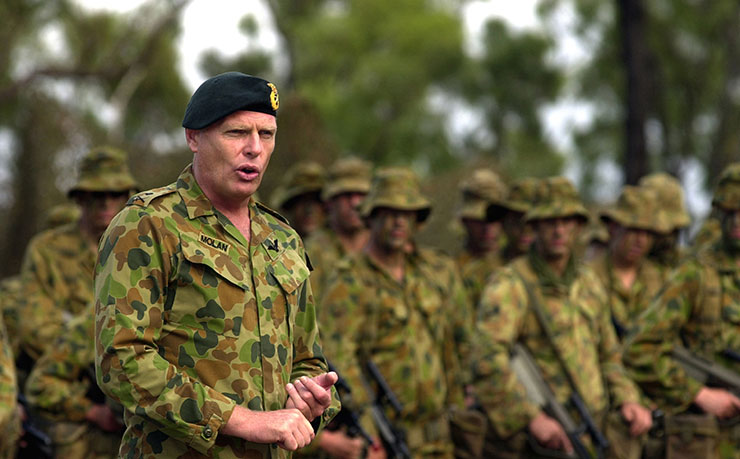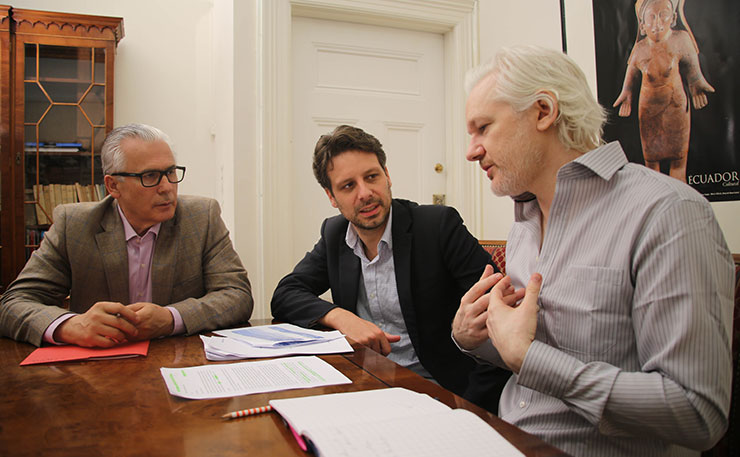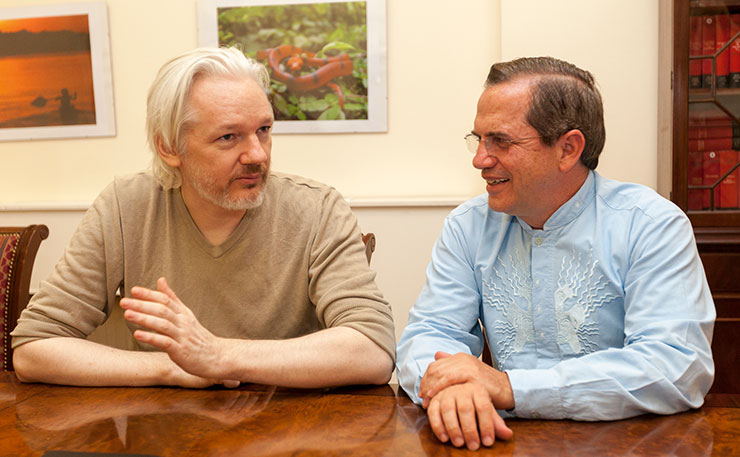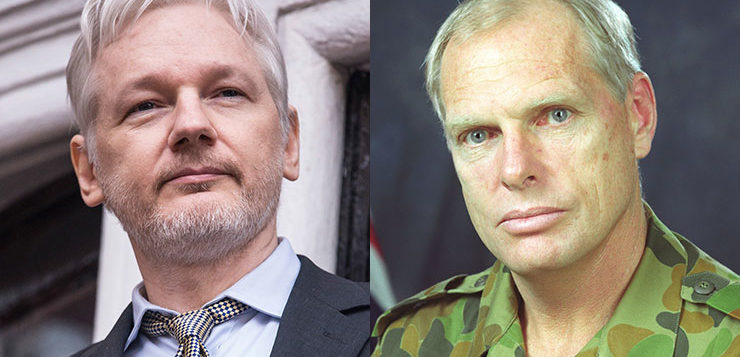DON’T MISS ANYTHING! ONE CLICK TO GET NEW MATILDA DELIVERED DIRECT TO YOUR INBOX, FREE!
Perception may be reality in politics, but when it comes to the politics of war, the Australian community’s perception is a long way from reality, writes Stuart Rees.
Trials by public opinion maintain stereotype images of heroes and villains. Former General Jim Molan, Commander of Coalition forces in Iraq is presented as a hero. Journalist Julian Assange, who faces extradition to the US and up to 175 years in prison has been derided, demonized and treated as a villain.
But let’s ask a newly informed court of public opinion what they think of the stereotypes. Following the presentation of different information, let’s test if previous labelling had been wrong: Assange becomes the improbable hero, Molan the unexpected villain.
The General’s Record
We begin by reminding the public that General Molan was in charge of US and Iraqi forces in the 2004 second siege of Fallujah, a city with a population estimated to be between 300,000 and 435,000. Military claims about Fallujah said it was full of ‘thugs’, ‘savages’ and ‘barbarians’. Therefore, argued a US commander, it should be ‘eradicated’ like Dresden and Hiroshima.
In response to the accounts of the fate of the inhabitants of Fallujah, public opinion should be reminded of General Molan’s assertion, recorded in his book, Running the War in Iraq that he was responsible for planning and directing attacks on the city. He also insisted that his actions represented ‘the rule of law.’
To reconstruct what happened under Molan’s command, the public might consider the mismatch between official claims about the 2004 second siege of Fallujah and direct observations of Iraqis and US soldiers who were present. Evidence from the recently published book, The Sacking of Fallujah: A People’s History (from which subsequent quotes are derived) should assist public understanding.
The authors analysed the destruction of a city, a people and their lives. They refer to ‘Sociocide’, the destruction of an entire way of life and to ‘Ecocide’, the destruction of an environment.

That sociocide-ecocide narrative indicates that the planning and implementation of military assaults showed a deliberate disregard for civilian casualties, and that Fallujah became a “symbol of cruelty, devastation and occupation.”
The combat took place in and around mosques, hospitals, residential neighborhoods and other structures normally protected by the Geneva Conventions. US Marine Ross Caputi, who participated in the second siege, says, “I watched as the carnage changed people around me and violent hysteria developed in my unit.”
Caputi asks, “Was it too painful for the decision makers to admit to themselves that we were hurting innocent people. Or were they so evil that they just did not care who they were hurting?” Under Molan’s command it looks as though an entire population became refugees and no-one took responsibility for their well-being.
Adverse judgements about the General’s leadership have referred to prohibited weapons, including hunger and deprivation, deployed against a civilian population. The use of white phosphorous and depleted uranium constitutes a war crime and the US military admitted that white phosphorous was used as a direct fire weapon in Fallujah. In response to that admission, a US veteran explained, “Yes… burned bodies, it burned children, it burned women. White phosphorous kills indiscriminately.”
As to the question about actions committed under Molan’s command, the public should be reminded that controversy is not entirely about the use of prohibited weapons. An invasion using conventional weapons to exact savagery and destruction can also amount to war crimes.
Noam Chomsky insists, “All the evil in the tortured land of Iraq that flows from the US and UK invasion is illegal.” Francis Boyle, Professor of Law at the University of Illinois regards the operation in Fallujah “as a war crime… showing little if any respect for the fundamental considerations of international law and international organizations and human rights.”
A city was destroyed and an environment polluted but is it possible to say that such destruction and pollution also had detrimental effects on the health of Fallujah citizens?
Within a year of the second siege, staff at the Fallujah General Hospital were reported as having noticed dramatic increases in the rates of cancer, still births, miscarriages and birth defects. Weapons which poisoned land, contributed to starvation, homelessness and to serious illnesses could be linked to birth defects, though the military always says that nothing can be proven.
Dr Samira Alaani, a pediatrician at the Fallujah General Hospital, diagnosed birth defects and catalogued data. She identified typical and atypical deformities including children with cleft palates, with enlarged heads, an infant with one eye in the middle of a forehead and one with intestines protruding outside its body.
A report by Dr Chris Busby in the International Journal of Environmental Research and Public Health concluded that data from Fallujah showed “the highest rated of genetic damage of any population ever studied. It’s worse than Hiroshima.”
The Journalist’s Reputation
Now we come to the labelling of Julian Assange, and the case for rejecting the negative image which has been sustained for years. Untested assumptions about Assange insist he is not a journalist, that he committed rape in Sweden, and by releasing classified information put lives at risk in Iraq and Afghanistan.
Adverse publicity begins with the claim that Assange is not a journalist and is not entitled to protection from The First Amendment of the US constitution concerning freedom of speech and of the press. In the US, this claim has enabled the Justice Department to concoct espionage charges derived from a 100-years-old law.
In this controversy as to who is a journalist, US commentators have used derision as proof. They ignore Assange’s engagement in routine journalistic work such as encouraging sources to provide sensitive information and to hide a source’s identity. His conduct was similar to staff on reputable newspapers with whom he shared documents: The Guardian, the New York Times, Le Monde, El Pais, and Der Spiegel.
In the Sydney Morning Herald, Nick Miller wrote that the US indictment against Assange “covers a lot of practices that are standard to investigative journalism: appealing for information, encouraging a source to provide documents that are not publicly available and reporting classified information that you believe is in the public interest….”

In Crikey, Bernard Keane, wrote, “If you don’t think WikiLeaks is a publisher or you think that Assange should be rendered to the US, then you think that what they revealed -war crimes, indiscriminate murder, systematic corruption – should have stayed secret.”
The labelling of Assange has been fostered by threatened charges of sexual assault by Swedish authorities. In her judgement about that issue, Anne Ramberg, Secretary General of the Swedish Bar Association, has said that the handling of the case by Swedish and UK authorities had been ‘deplorable.’ The right to a fair trial within a reasonable time frame had not occurred.
“I have sympathy for Assange’s concern that Sweden would acquiesce with the United States in the event of a request for his extradition.” She also said, “The Assange case is ultimately about the right and moral obligation to expose war crimes. Assange and Wikileaks did it. The revelations about US abuse were necessary and particularly important.”
In Stockholm in the first week of June 2019, a judge dropped the case against Assange. The former President of the Swedish Bar Association commented, “I share the opinion that the District Court was correct in its decision to drop the investigation entirely, once and for all.”
Now let’s consider the essence of the US espionage charges against Assange. The specific indictment says that he “created a grave and imminent risk that innocent people he named would suffer serious physical harm and/or arbitrary detention.”
Those who have examined the Wikileaks cables about Iraq and Afghanistan would know these claims have been promoted by those who dare not question US motives. In his analysis of the WikiLeaks revelations, discussed in What Uncle Sam Wants, Professor Clinton Fernandes concluded that Assange and WikiLeaks did not identify people by name and put no-one’s lives at risk.
An Australian Defence Taskforce report concluded that the WikiLeaks disclosures “were largely insignificant and did not cause any real harm to US interests… and no Afghans with whom Australia has worked are identifiable.”
Assange did unveil secrets which powerful governments and companies wanted to keep secret. The 2010 collateral damage video showed US gunners in an Apache helicopter shooting dead at least 12 unarmed civilians in a Baghdad suburb. He revealed the rationale and rules for torture in the operating procedures for Guantanamo Bay and Camp Delta. He posted videos of Tibetan dissidents fighting back against the Chinese and he revealed that the Russian government spied on its citizens’ cell phones. The Iraq war logs showed details of the illegal invasion of Iraq and the 90,000 Afghan war diaries document destruction in Afghanistan.
Hostility to Assange also came from corporate leaders. Barclays Bank was shown to have used a tax avoidance scheme to net one billion pounds. The Bilderberg documents showed how European and US government, corporate and media operatives participated in secret meetings to foster their interests, provided all participants kept the promise to report nothing. Assange showed how the Stratfor security group based in Austin Texas targeted activists and protesters, spied on groups such as Occupy Wall Street and protesters against the Bhopal gas disaster.
The victimizing of Assange continues even though he’s in jail. Jeremy Hunt the British Foreign Minister, a contender for the Tory Party leadership, says that he put people’s lives at risk.
Publicity Reaches A Different Verdict
Unless the victimizing of Assange ends and the glitter on warmongers is erased, wars will continue, crimes against humanity will persist, so too the denials that these crimes ever happened. The public will remain confused. A mainstream media, owned and run by establishment interests will not have the courage to reveal truths.
Julian Assange has been damned and scapegoated by an ill-informed public, including revengeful politicians who have relied on derision about his character, not evidence about his actions. A different public opinion, less vindictive, far better informed, would see a significant citizen who should be freed and to whom the defenders of investigative journalism should be grateful.
General Jim Molan has been lauded. Yet if the veil of history is pulled aside, public opinion would witness the second siege of Fallujah, a slaughter of thousands of citizens, the destruction of a way of life, the poisoning of the surrounding environment and genetic damage allegedly worse than the consequences of the atomic bomb dropped on Hiroshima.

To suggest that war crimes were committed in Fallujah and the people at the top be held responsible, a reflective public will need to digest the record of horrendous events. At the very least, public opinion should cease lauding one man and colluding in the punishment of another.
A better-informed public would surely exonerate Julian Assange and raise questions about serious charges to be put to former General Jim Molan. If that happened, the previous hero/villain judgements about the two would be reversed.
DON’T MISS ANYTHING! ONE CLICK TO GET NEW MATILDA DELIVERED DIRECT TO YOUR INBOX, FREE!
Donate To New Matilda
New Matilda is a small, independent media outlet. We survive through reader contributions, and never losing a lawsuit. If you got something from this article, giving something back helps us to continue speaking truth to power. Every little bit counts.




